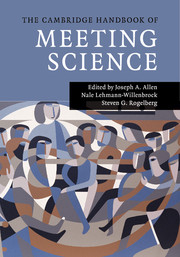Book contents
- The Cambridge Handbook of Meeting Science
- The Cambridge Handbook of Meeting Science
- Copyright page
- Dedication
- Contents
- Tables
- Figures
- Contributors
- Book part
- Part I Introduction
- Part II Premeeting Activities and Context
- Part III The Meeting Itself
- Capturing and Understanding Dynamics and Processes of the Meeting
- Tools and Models for Promoting Meeting Success
- 21 Designing and Executing Effective Meetings with Codified Best Facilitation Practices
- 22 Finding the Gorilla
- 23 Information Utilization in Meetings
- 24 What Is Consensus and How Is It Achieved in Meetings?
- 25 Creativity and Meetings
- Part IV Special Types of Meetings
- Part V Synthesis and Conclusion
- Book part
- Author Index
- Subject Index
- References
25 - Creativity and Meetings
Do Team Meetings Facilitate or Hinder Creative Team Performance?
from Tools and Models for Promoting Meeting Success
Published online by Cambridge University Press: 05 August 2015
- The Cambridge Handbook of Meeting Science
- The Cambridge Handbook of Meeting Science
- Copyright page
- Dedication
- Contents
- Tables
- Figures
- Contributors
- Book part
- Part I Introduction
- Part II Premeeting Activities and Context
- Part III The Meeting Itself
- Capturing and Understanding Dynamics and Processes of the Meeting
- Tools and Models for Promoting Meeting Success
- 21 Designing and Executing Effective Meetings with Codified Best Facilitation Practices
- 22 Finding the Gorilla
- 23 Information Utilization in Meetings
- 24 What Is Consensus and How Is It Achieved in Meetings?
- 25 Creativity and Meetings
- Part IV Special Types of Meetings
- Part V Synthesis and Conclusion
- Book part
- Author Index
- Subject Index
- References
Summary
This chapter explores factors that may enhance or inhibit creativity in team meetings. Teams may have additional creative performance benefits compared to individuals, but research on creativity at the team level has not found consistent results. In past research, the context in which teams work has received limited attention, and no research has focused exclusively on creativity in the context of meetings directly. The purpose of this chapter is address that research gap. We begin with a definition of creativity and a discussion of its importance to organizations. We then discuss the ways in which meetings provide the opportunity for teams to be creative. Specifically, we review the cognitive process of creativity, including problem identification and construction, identification of relevant information, generation of new ideas, and the evaluation of these ideas. Next, we outline the social processes that take place in team meetings, including communication, trust and psychological safety, team support for innovation, and team conflict. Finally, we provide recommendations for facilitating creativity in team meetings.
- Type
- Chapter
- Information
- The Cambridge Handbook of Meeting Science , pp. 585 - 614Publisher: Cambridge University PressPrint publication year: 2015
References
- 3
- Cited by

